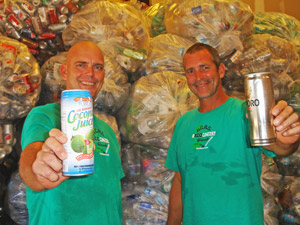Recycling And Redeeming

James Higginbotham and Bill Prout encourage everyone to recycle their beverage containers. Coco Zickos photo
Co-owner of Kaua‘i Community Recycling Service
Please tell us about your business. Kaua’i Community Recycling Service is a state-certified redemption service owned by myself and Bill Prout.
Our office is located in Kapa’a, but we offer our services around the island. We try to make it easier for people to recycle their beverage containers and get their refund that they have to initially pay at the store. We’re trying to make it convenient for them to get that money back by operating at the different locations.
Where are those locations? We operate out of Kekaha Wednesdays and Saturdays from 8 a.m. to 4 p.m.; Koloa Thursdays and Sundays from 8 a.m. to 4 p.m., and here at our warehouse in Kapa’a five days a week, Monday through Friday, 8 a.m. to 4 p.m. We are also in Kilauea at Kaua’i Mini Golf Wednesdays and Fridays, 8 a.m. to 4 p.m.
How did this business get started? I started this business about 10 years ago. It was originally a curbside business, servicing about 1,000 homes on the island from the South to the North Shore. We recycled everything: newspapers, cardboard, junk mail, plastic and aluminum. When the bottle bill came into effect, we actually decided to change our business model to adapt. So instead of us having to drive everywhere, which was time-consuming as well as costly with gas, now people bring us their recyclables.
What is the bottle bill? It’s the HI-5 bottle bill, which means any beverage container, plastic, glass or aluminum, less than 64 fluid ounces that has the HI-5 symbol on it, excluding wine, hard liquor and milk containers, can be recycled for a nickel. You pay a six-cent deposit at the store and we refund you five cents.
How much money have you refunded? We’ve dished out close to $5 million and we’ve recycled more than 100 million containers since we adopted our business to accommodate the bottle bill.
How does your business earn money? I hand out my nickel and when I send in my reports to the state, I get my nickel back plus three cents per container. So the state pays us three cents per container to operate the redemption centers. That money comes from the HI-5 fund where people aren’t recycling and retrieving their refund.
Where do the containers go after you collect them? All of our stuff goes to Seattle, where it gets recycled and reused.
Why did you get into this business? The whole reason I got into this recycling business is because I wanted to help the island. We used to be stationed over at the Kekaha landfill. I used to just watch that thing grow and it soon became Mount Kekaha. You can’t keep building landfills on a small island – people have to recycle.
What is the most rewarding aspect of what you do? Watching the people walk out with a pocketful of cash. I also really enjoy doing free pick-ups for churches and schools when they have events. I really enjoy what I do – it’s a good-karma business. People can’t help but love you when you’re handing out money. It’s a very pleasant and enjoyable experience.
What is the most challenging aspect of what you do? Right now we have a contract with the county that gets its money through a contract with the state to operate redemption centers at Kekaha and Koloa. The contract is expiring in one year, and the state says they are not renewing the contract next year, and it’s going to make a lot of people upset if we have to close those redemption centers. Most of the people on the Westside come to us, it’s one of our busiest sites, and if we’re not there they don’t have anywhere to go.
How much do you recycle on a regular basis at one of your sites? In Kekaha, we do about 100,000 containers per day. We refund about $70,000 per month back to the public. That’s about 1.4 million bottles.
What should people do with their recyclables when they bring them to you? Just make sure your caps are removed so that any liquid that might still be in there can drain out or evaporate. Mainly just remove your caps and separate plastics, glass and aluminums. And when you get to us, you don’t even have to get out of your car. It’s a breeze.
645-1676
www.kcrskauai.com



